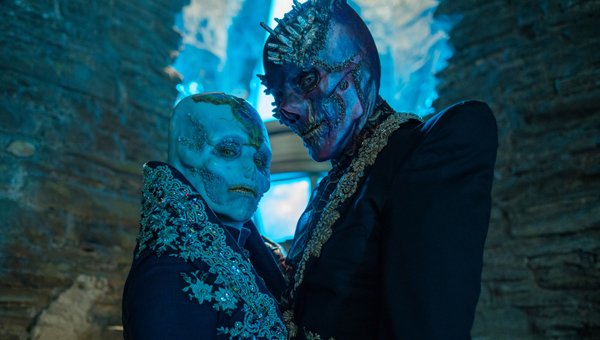Doctor Who ratings are often the subject of intense scrutiny! How did Doctor Who: Flux fare?
(Updated 14/12/21)

The new series of Doctor Who has now finished and the press and fans alike have been scrutinising the all-important numbers. Whilst some people question the relevance of viewing figures in the age of on-demand TV and streaming, they do still paint a picture of how many people are engaging with a programme. Indeed, the Doctor Who ratings also take into account those people who accessed the show on BBC iPlayer, and those who caught up with the programme seven days after the original transmission.
Inevitably, the Doctor Who ratings are generally lower than they were, say, during David Tennant’s era. The way people consume television has changed; when David Tennant was the Doctor, there was no such thing as iPlayer (not before 2007, anyway.) Catch-up TV was in its infancy. If you missed a programme during its original broadcast, you could have to wait a long time before you could see it again. It was all-the-more important to be in front of your TV when a show aired.
So with all this in mind, how did the Doctor Who ratings fare this time round? Well, the first episode of Doctor Who: Flux – ‘The Halloween Apocalypse’ – did respectfully with a final viewing figure of 5.79 million, making it the ninth most-watched programme of the week on British TV.

Naturally, there was a dip by the time the second episode ‘War of the Sontarans’ came around. Doctor Who ratings often drop after the start of a new season, and this trend continued with Flux episode two, which achieved 5.10 million viewers and became the 13th most-watched of the week.
The third episode, meanwhile, also saw a slight decline. ‘Once, Upon Time’ achieved a final figure of 4.67, followed by 4.55 million for ‘Village of the Angels.’ The latter is Doctor Who‘s lowest-record figure since the series returned in 2005.
‘Survivors of the Flux’ saw a slight rise with 4.72 million tuning in. ‘The Vanquishers’ had a final rating of of 4.61 million.
According to calculations on the Doctor Who News Page, these Doctor Who ratings come to an average of 5.10 million for the year. Apparently, this is the lowest annual rating since the programme returned in 2005, although the series scored lower than 5 million in 1986, 1987 and 1989.
So what are we to make of these Doctor Who ratings? Are they good? Bad…?

Well, these Doctor Who ratings are in a similar ballpark to Series 12, where many of the season’s episodes came in around the 4-5 million mark. But the Doctor Who: Flux season opener was roughly a million lower than the Series 12 season opener ‘Spyfall: Part One’ – which got 6.89 million viewers – and was in fact the lowest-rated season opener for any series of New Who.
This is a trend that the Doctor Who ratings have followed since 2017. Series 11 frequently saw episodes which exceeded 8 million, such as ‘The Woman Who Fell to Earth,’ ‘The Ghost Monument,’ ‘Rosa,’ and ‘Arachnids in the UK.’ Indeed, ‘Arachnids’ was the last time the Doctor Who ratings went above 8 million.
There was a slight uptick with the launch of Series 12, with the two-part opener ‘Spyfall’ achieving 6.89 and 6.07 million respectively. This dipped to a low of 4.90 for the seventh episode ‘Can You Hear Me?’ and ended on 4.69 for ‘The Timeless Children.’

But what about the episodes themselves? Did people enjoy them?
One of the best ways to answer this question is by looking at the Audience Appreciation Index – a score out of a hundred which is derived from a survey of 5,000 specially-selected people. Generally, a figure of 60 is considered poor, and anything above 85 is excellent.
With this in mind, it’s fair to say that Doctor Who: Flux is performing averagely. ‘The Halloween Apocalypse’ achieved an AI figure of 76, whilst ‘War of the Sontarans’ scored 77 and ‘Once, Upon Time’ scored 75. However, it should be noted that the latter score is actually the lowest achieved by an episode of New Who since it began in 2005, its nearest competitor being the 2006 episode ‘Love & Monsters,’ which scored 76.
Indeed, as the Radio Times put it: “‘Once, Upon Time’ is one of the most dizzying and blatantly confusing episodes of Doctor Who – and I’ve sat through a fair few – which makes it tricky to engage with… At a time when Doctor Who needs to broaden its appeal, alienating its potential audience rather than drawing it in is a risky business.”
It added: “Followers who abhorred ‘The Timeless Children‘ (the series 12 finale in 2020), especially the dismally ‘Mastersplained’ new backstory for the Doctor, will likely throw up their arms in horror as those missing chunks of the Doctor’s past are given further currency and legitimised by the events of ‘Once, Upon Time.’ But this is where some of the gems lie. One glistening jewel is the unexpected return of ‘Doctor Ruth’ (the ‘Fugitive Doctor’ as she is billed), the past incarnation played majestically by Jo Martin. Any excuse for another glimpse of her, please.”

And speaking of the critical response, it goes without saying that you will get a different impression depending on which publications you read. But if we take a look at Rotten Tomatoes (which consolidates scores from a number of publications to come up with an average figure) ‘The Halloween Apocalypse’ currently has an average score of 6.8/10, followed by ‘War of Sontarans’ which has an average score of 7.30/10. ‘Once, Upon Time,’ meanwhile, currently has an average score of 7.20/10.
‘Village of the Angels’ currently has 8/10; ‘Survivors of the Flux’ has 6.3/10, and ‘The Vanquishers’ does not yet have a consensus.
Now, usually when Doctor Who ratings come under such close scrutiny, people often speculate about the show’s future and potential cancellation, even when the ratings are good! But we know this is not a discussion that can be had around Doctor Who: Flux, no matter what the ratings do; we already know that the former showrunner Russell T Davies will be returning to the fold in 2023 to oversee the show’s 60th anniversary and series beyond. So even if the ratings fall off a cliff and everybody hates Jodie Whittaker’s final episodes, there will still be more Who to look forward to.
Undoubtedly, Doctor Who: Flux was a complex story, but it didn’t pretend otherwise. For a rundown on all the key characters, check out our handy guide.
What do you think of these Doctor Who ratings? And did you enjoy Doctor Who: Flux? Let me know in the comments below.

Doctor Who Christmas scarf – order now from the Lovarzi shop!


With the regeneration of Jodie Whittaker as Dr. Who, I find this to be a totally different series than the previous Dr. Who series. The transformation from male to female nullifies logic and contradicts all previous future and past time encounters with Dr. Who laid out in past season episodes. The new characters, scripts and special effects have done everything they can to confuse and make complex all the time stream theories laid out by previous Dr. Who series. Also, the English accents of the characters have become worse, the sound quality seems degraded, and most of the time I can’t understand what Dr. Who and her companions are saying! I don’t watch this series any more.. I treasure and have collected all of the past classic episodes. I want entertainment with intelligence… not intelligence without entertainment.
“English accents have become worse…” I’m sure you didn’t intend it, but this reads as a bit of snobbery aimed at regional accents. Not everyone in this country speaks like the Queen, and it’s long past time that Doctor Who reflected that reality.
As for the gender change “nullifying logic”… let’s take it from the top. The Doctor is an alien. “Logic”, by which perhaps you mean human biology, does not apply. Time Lords can, do and have changed gender. There is no narrative reason why they shouldn’t. And there never has been.